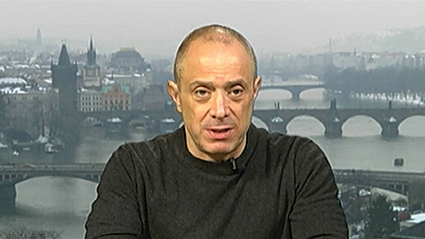Brian Whitmore on Saakashvili, Russia & Putin
Interview
If you follow Kremlin politics and the post-soviet space in general, then Radio Free Europe’s Brian Whitmore and his brief but punch-packing Power Vertical feature is must-watch material. Mr. Whitmore was kind enough to find time for a brief interview with GEORGIA TODAY, talking (what else?) about Ex-President, Ex-Governor, part-time entertainer Mikheil Saakashvili and his eternal nemesis, the Tsar of all Russia.
Let’s start by discussing the Saakashvili saga. What’s your take on the political turmoil surrounding him?
There are different processes going on in Ukraine and Georgia. I think the whole saga is destabilizing both countries. And the only person who it is getting a smile out of it is Vladimir Putin.
Saakashvili always mentions of Putin in his speeches. Do you buy Saakashvili’s narrative that all problems (in Ukraine and Georgia) have been concocted by the Kremlin?
No, I don’t, but I think the Kremlin exploits the situation as it exists, and it is an easy situation for them to exploit!
Has Western support of Saakashvili diminished?
I can’t speak for everybody in Europe and USA, but personally speaking, I’d say his prestige has certainly diminished in recent years.
What does his potential extradition to Georgia spell for Georgia and Ukraine relations? How will it affect the image of the country?
My fear is that it may be potentially very destabilizing for Georgia. He still has supporters in Georgia, and if you extradite him to Georgia for trial, it may lead to instability. People would take to the streets. It’s a very dangerous game to play, as much for Ukraine. These are two important countries struggling between two systems of governance right now: the western and the eastern.
Freedom House’s recent report said very little good about the situation in Ukraine and Georgia, claiming the next year will be decisive for Georgia as to its democratic path. As an independent international observer, would you say Georgia is stagnating in its democratic processes?
I see some signs that worry me. Particularly the recent constitutional reforms, but I think Georgia is on a democratic path.
Alexei Navalny was banned from the presidential race, despite being (as you said) a real Russian opposition leader. Do you think Navalny, had he been president, would ever have reconsidered the official Russian stance towards Georgia’s breakaway regions?
I think it’s highly unlikely that anything would have changed. Mr Navalny does not speak very much on foreign affairs for a good reason – he does not want to take unpopular stances. So, I certainly wouldn’t have expected the Russia position to change after Navalny. Remember, the Abkhazian and South Ossetia conflicts began under Yeltsin, not Putin. I would not expect the hypothetical president Navalny to have approached these conflicts differently.
What would Navalny’s Russia be like? Would we see a more westernized Russia?
It’s highly unlikely that he'll be the president any time soon. Right now, he is the opposition leader. We really don’t know what Navalny’s Russia would be like, we don’t know what kind of president he would be in reality.
Putin will most likely end up being president again. In retrospect, as he nears the time when he has to pick his successor, what do you think it spells for the post-Soviet space and particularly EaP countries?
Putin is entering his lame duck period. We can predict that he is going to win the election in March, but there is growing consensus in Moscow that this is Putin’s last term. What will happen next, people can only guess. As a result, the elite and clans and leaders in the Kremlin are going to start positioning themselves ready for the post-Putin world. We know from experience that when that happens, Russia can get very unstable. Think about last couple of years of the Yeltsin period and its clan warfare. Think about 2007, when it looked like Putin was leaving after two terms: we had the Siloviki wars. So, I think we’re in for a period of turbulence in Russia which happens when the elite is unsure of the future. There’s a lot of discussion now on creating a post-presidential position for Putin, described in Russian media as the Russian ‘Ayatolla.’ They could do some kind of constitutional reform to keep Putin after his next term. He’s a male role-model; he can take his shirt off and ride a horse if he wants! But the feeling in Moscow right now is that his presidency is coming to an end. This election is about the end of an era, though, not really about the beginning of something new. And when we get in such periods, Russia becomes unstable.
Many Georgians identify Russia with Putin and think that trouble with Russia is going to end when Putin ends physically, or his reign ends. How much do you think that assumption is true?
I think Russia will still be Russia. Putin’s Russia is a bit more aggressive than, say, Boris Yeltsin’s Russia. But remember the conflicts in Abkhazia and South Ossetia conflicts began under President Yeltsin. Anybody who thinks that Georgia or other neighbors will see an end to their problems when Putin leaves is just fantasizing. I don’t think that’s the case at all. What happens periodically with Russia is that it weakens and is forced to look inwards. And when it looks inwards, it gives its neighbors a chance to defend themselves more. That may happen under Putin or after Putin. But the issue is whether Russia is feeling strong or weak. I think the Russian economy could create problems and Russia will have to look inwards at some point. I do not expect problems to automatically disappear when Putin is no longer there.
Vazha Tavberidze












